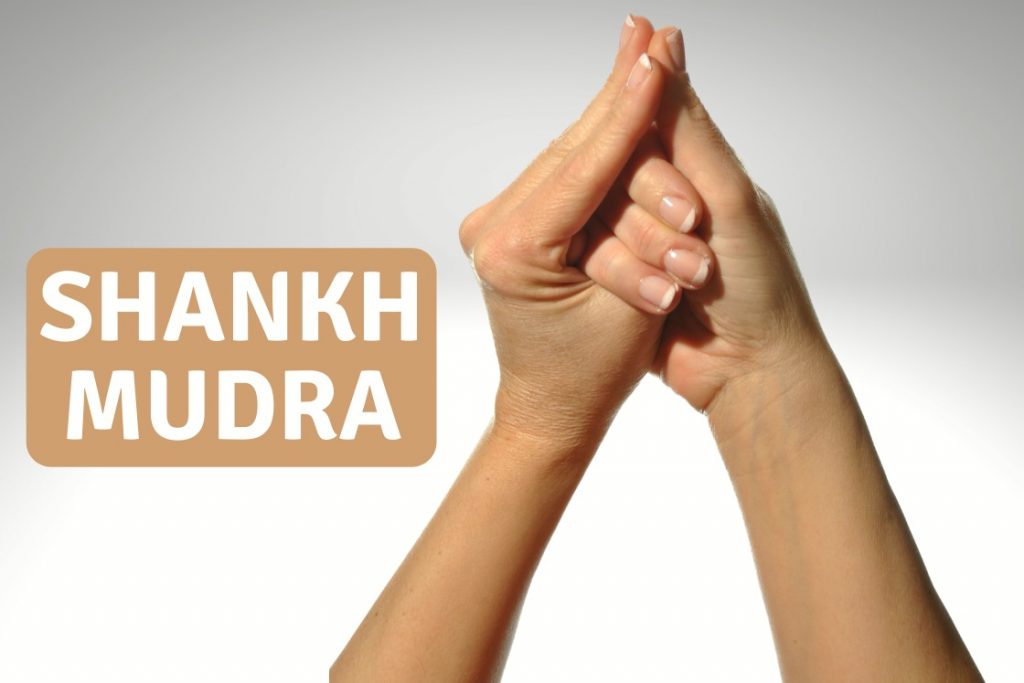
Shankh Mudra is a hand gesture that looks like the shape of a ‘chank’ or ‘Conch Shell‘. Conch is an instrument that is played in rituals and religious importance in Hinduism as an emblem of auspiciousness.
In Yogic practices, seeker usually makes Shankh mudra with their hands while, worshiping, chanting hymns, and mantras. Therefore, Shankh mudra can be considered a good alternative gesture to ‘Namaste’ or Anjali Mudra.
Use & Significance

Shankh Mudra is also called ‘Conch Shell Gesture‘. Just like a conch is a symbol of auspiciousness, removes negativity, on performing shankh mudra our negative thoughts, energies, and impurities in our spiritual path get vanished. If we concentrate on the sound of the conch shell, it’s actually the sound of ‘OM’. We can get the benefits of blowing Shankh by emulating this mudra while chanting the OM mantra. Indeed, the sound of OM in this mudra pulls you out of that chaos of mind which obstructs you to follow your inner voice.
You will never follow your own inner voice until you clear up the doubts in your mind.
Roy T. Bennett, Author of The Light in the Heart
For this, we hold hands in this gesture at the heart center, just below the throat as we do while doing Namaste and concentrate on the chanting echo of OM. Practicing this mudra while OM chanting stimulates the Vishuddhi chakra (Throat chakra), which is the seat for the communications and self-expression, vocals, etc.
How to Do Shankh Mudra(Steps)

Follow the steps below to do Shankh Mudra:
- Sit comfortably in Vajrasana (Thunderbolt Pose) on the floor, roll your shoulder back, and lengthen the spine.
- Bring both your hands in front of the solar plexus chakra facing tummy.
- Now wrap the four fingers of the right hand around the left thumb.
- Keep four fingers of the left-hand straight and pointing up. Roll the encircled thumb a little to adjust it in upwards.
- Now once left hand all fingers pointing up, join the tip of the right thumb with the middle finger of the left hand.
- Now your hands will look like a conch shell. Hold this arrangement of fingers and bring your hands at the heart center, exactly at the breastbone.
- Close your eyes while chanting OM in the mind and focus on deep breathing. You can also listen to OM chanting and focus on the echo it produces.
- Once done with the left thumb encircled, you can reverse the position of fingers and practice it for another round.
Some persons found it difficult to hold shankh mudra for longer duration. There is another variation of it named Sahaja Shankh Mudra aka simplified conch shell gesture. It’s beneficial especially in speech problems and enhancing the physical aura of a person.
How It works
The thumb represents the fire element in our body, which when encircled by the fingers of the opposing hand in Shankh mudra subdues the excessive fire.
Simultaneously, the thumb of the other hand touches the tip of the middle finger of the opposite hand. This contact brings the ether element in the balance which creates more space within the body for the assimilation and digestion process. Also, larger space also symbolizes that it makes you think out of the box.
The inner spiral of our hands in Shankh mudra is equated with the coil of the human digestive system. Thus, Shankh mudra is considered a useful practice to calm down the excessive digestive fire which can cause constipation and stomach ulcers. Also, persons who feel uncomfortable after the overdoing of Surya Mudra (which individuals usually do to weight loss), can do shankh mudra for instant relief.
Time & Duration
Time and duration have a significant effect on the practice of Shankha Mudra. In one sitting one can do this mudra from a few minutes to the 1 hour. However, ideally, it’s recommended to do 15 minutes in one sitting and follow it 3 times a day i.e. 45 minutes a day. Though a person with allergic symptoms, fever, digestive problems can do it for a longer period.
Shankh mudra is most beneficial when practiced in the morning. The fresh air of morning add ups its purification mechanism and expands the peaceful feeling and positivity.
Shankh Mudra Benefits
- Shankha Mudra overcomes the fear of speaking in front of others as it stimulates vishuddha chakra.
- Helps in growth and maturation. Thyroxine hormone secreted from the thyroid gland. Therefore, also responsible for the height increment.
- Helps in vocals disorder such as stuttering and stammering. Moreover, also improve the functioning of the larynx (voice box).
- Due to its action on Pitta Dosha, shankh mudra alleviates the itchy skin, red rashes problems.
- Persons with loss of appetite can do this mudra. It brings the digestive system on the track that increases the appetite.
- Practicing this mudra clarifies the voice and improve speech delivery, which further boosts the confidence.
- Provide a rejuvenating effect on 72000 Nadis while chanting OM practicing this Mudra.
- Helps overcome throat infections like tonsillitis and other throat-related allergies.
- Provides a soothing and calming effect on the mind, removing negativity and promoting harmony.
Shankh Mudra for Thyroid
For people with thyroid problems, shankh mudra is most beneficial as it comprises chanting of the calming sound of OM. Chanting OM in this mudra or even listening to it in bedtime produces a vibration directly from vocal cords. This vibration stimulates the thyroid gland that secretes thyroxine and triiodothyronine hormones. In this way, the regular practice of Shankh mudra alleviates hypothyroidism and associated problems.
Shankh Mudra Side Effects
- Anxiety: Overdoing Shankh Mudra can increase anxiety levels in individuals, especially those with a Vata dosha imbalance.
- Excessive Sleepiness: Practicing Shankh Mudra excessively may lead to excessive sleepiness, particularly in individuals with a Kapha dosha imbalance.
- Physical Discomfort: Holding the mudra position for an extended period may cause discomfort in the fingers, hands, and arms, leading to strain.
Conclusion
Shankha Mudra is a powerful practice that harmonizes the mind, enhances communication, and promotes spiritual growth. By integrating this mudra into your daily routine, you can experience its profound benefits, paving the way for greater clarity, confidence, and inner peace.

